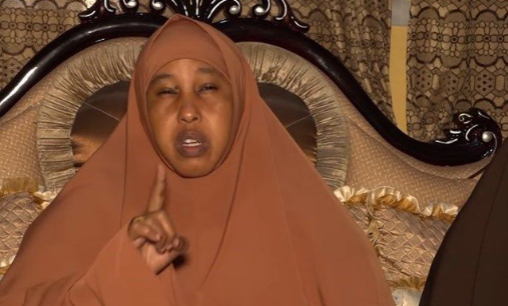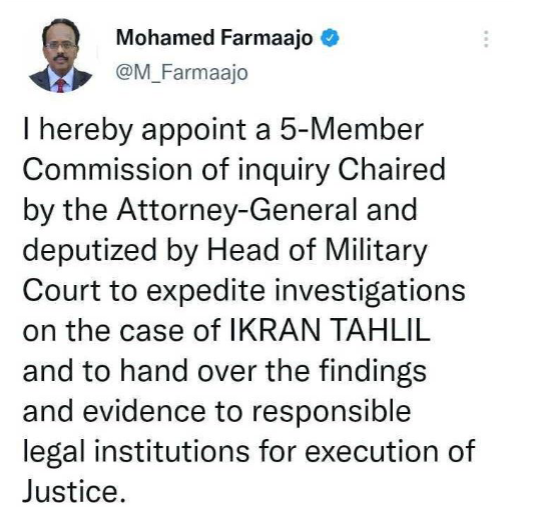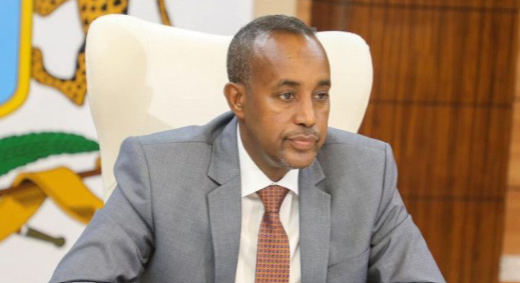
The family of the Somali intelligence officer, Ikran Tahlil, who went missing June this
year, on Tuesday 14th September, rejected a commission of inquiry that was formed by President Mohamed Farmaajo to probe her disappearance. Ms Tahlil’s family rejected the appointment of the commission saying they only trusted the military court to handle the case.

“We are not confident and will not accept the commission of inquiry the
president has appointed to investigate the case of Ikran. We are only
confident in the military court, which is where we had filed a case,” Qali
Mohamud, Ms Tahlil’s mother, told an international pay television network.
The family of the missing security agent was reacting to a Monday announcement by Farmaajo, where in a tweet he said that a five-member panel had been appointed to probe the matter, and upon completing its investigations, would be expected to submit its findings to the “responsible legal institutions for execution of justice.”


The disappearance of the security agent has also sparked sharp disagreements between President Farmaajo and his Prime Minister Hussein Roble, who recently
accused the president of allegedly obstructing the inquiry into the whereabouts of
the intelligence agent.

“That is a dangerous existential threat to the country’s governance system,” said Roble, who described a pattern of interference in the investigative remit of Somalia’s justice agencies.
Roble went ahead last Wednesday In a late-night move, to fire the head of the National Intelligence and Security Agency (NISA) over his handling of the high-profile disappearance case, and decided to put another man in charge. The premier replaced him with a Farmajo critic, triggering an angry response from the president.
Farmajo reacted by saying the sacking of the security agency head was “illegal and
unconstitutional” and overruled his prime minister, afterwards, he went ahead to name another appointee to the top job, and also appointed the dismissed intelligence chief as his national security adviser.
Roble, a Swedish-trained civil engineer, was appointed prime minister by Farmaajo
September last year, after his predecessor was ousted in a parliamentary no-
confidence vote. Farmaajo and his premier have often clashed in the past, with the
row threatening to throw an already fragile electoral process into deeper trouble, bearing in mind that the country’s pending elections are already months behind
schedule. Their recent dispute over the handling of the disappearance of the
security agent led the UN to intervene.
“We urge Somali leaders to de-escalate the political confrontation surrounding this investigation and, in particular, avoid any actions that could lead to violence,” said a statement issued last Tuesday by the UN Assistance Mission in Somalia.
Farmajo’s mandate was extended by parliament in April, and led to deadly gun
battles in the streets of Mogadishu. Roble was appointed to ease the political tensions and deliver elections, and a new timetable to a vote was put together.
However the process fell behind, and Roble has since accused Farmajo of trying to
reclaim “election and security responsibilities” from him. Elections in Somalia follow
an indirect model, whereby state legislatures and clan delegates pick lawmakers for
the national parliament, who in turn chooses the president. The next phase is scheduled between October 1 and November 25.
The whereabouts of the abducted National Intelligence Officer remain unclear. On 2
September Somalia’s National Intelligence and Security Agency (NISA,) alleged that
the intelligence officer had been killed by Islamist extremists. However the Al-
Shabaab has denied any role in the disappearance and purported death of 25-year-
old Ikran Tahlil, whose family has reportedly accused NISA of allegedly being behind
her disappearance. Tahlil worked in NISA’s cyber-security department.
In this article
- Africa
- Developing News
- International
- News
- "We are not confident and will not accept the commission of inquiry the president has appointed to investigate the case of Ikran. We are only confident in the military court
- Hussein Roble
- Ikran Tahlil
- Missing Somali intelligence officer
- Ms Tahlil’s mother
- Mwanzo TV
- Mwanzotv.com
- President Farmaajo
- Somalia Prime Minister
- UN
- which is where we had filed a case